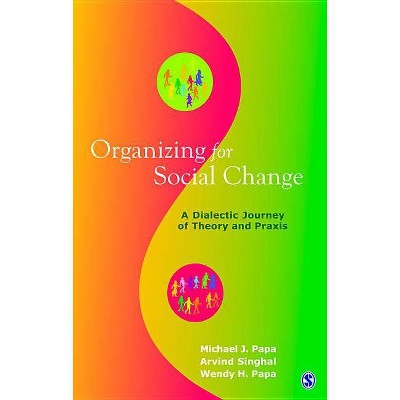Organizing for Social Change - by Michael J Papa & Arvind M Singhal & Wendy H Papa (Paperback)

Similar Products
Products of same category from the store
AllProduct info
<p/><br></br><p><b> Book Synopsis </b></p></br></br>`The body of work this book represents is clearly important both theoretically and in terms of encouraging scholars and practitioners in continuing efforts of large-scale change and social justice. The cases considered are fascinating, and the authors′ analyses of them are enlightening′ - <b><i>Katherine Miller </p> <p>Professor, Department of Communication, Texas A&M University</p> <p></b></i></p> <p>`In <b>Organizing for Social Change</b>, one rediscovers the value of dialectics within a theoretically complex story of empowerment and transformation that is told in a very personal tone with careful attention to detail′ - <b><i>Patrice M Buzzanell, Professor, Department of Communication, Purdue University</p> <p></b></i></p> <p>`Scholars and practitioners will find this book theoretically sound, methodologically rigorous, and rich with poignant narratives. The book models engaged scholarship; it is truly refreshing to encounter scholarship that matters to various stakeholders, academic and otherwise′ - <b><i>Lynn M. Harter</p> <p>Assistant Professor, School of Communication Studies, Ohio University</p> <p></b></i></p> <p>Conventionally, analysts of social change perceive organizational initiatives in binary terms: for instance, projects are seen as being either top-down or bottom-up; local culture is seen as being either modern or traditional. Challenging this restrictive dualistic sentiment, this important book argues that social change emerges in a nonlinear, circuitous and dialectic process of struggle between competing poles of action. In support of their approach, the authors: </p> <p></p> <p>- identify four dialectic tensions as being central to the process of organizing for social change: control and emancipation, oppression and empowerment, dissemination and dialogue, and fragmentation and unity;</p> <p></p> <p>- argue for a dialectic approach which acknowledges that contradictory tensions can and do co-exist (for example, a project can control beneficiaries with tough conditionalities even as it emancipates them through economic empowerment); and</p> <p></p> <p>- draw upon cases set in various contexts-social justice, academic, corporate, artistic, and others-from both developing and developed countries.</p> <p></p> <p>The authors elaborate their thesis by examining four cases in depth: the Grameen Bank in Bangladesh; the dairy cooperatives of India′s National Dairy Development Board; entertainment-education broadcasts and on-the-ground community organizing in Indian villages; and community suppers in Appalachia (USA). </p> <p></p> <p>Combining quality scholarship with a very interesting writing style, drawning from everyday life and its new insights into the processes of social change, this absorbing book is an essential text for scholars and practitioners of communication, social work, gender studies and social change.<p/><br></br><p><b> Review Quotes </b></p></br></br><br>An important feature of the book is the incorporation of principles of self-reflexivity, wheren the authore have not only detailed the field research methodologies but also their own theorectical beliefs, and acknowledged the relationship between the two...The book makes a valuable contribution to the discussion of dialectics in development, establishing how contradictions and contrary pulls and forces are not only normal but also necessary and beneficial in a bottom-up-people-centred development process.</p>--IIMB Management Review<br><br>Overall this book unfolds the gray area in the process of social change...This book is an essential deviation to understand that social change is a continuous dialectic process embedded with inevitable contradictory tensions. The book's comprehensive text provides easy and enjoyable reading, apart from providing a scholastic account on the subject.</p>--Social Change<br>
Price History
Cheapest price in the interval: 27.99 on October 22, 2021
Most expensive price in the interval: 27.99 on November 8, 2021
Price Archive shows prices from various stores, lets you see history and find the cheapest. There is no actual sale on the website. For all support, inquiry and suggestion messagescommunication@pricearchive.us




















